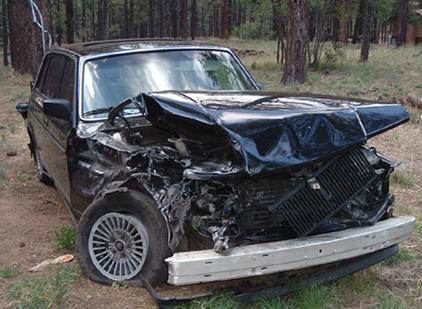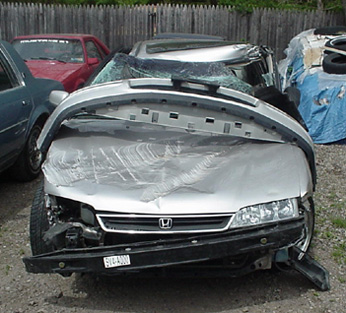PORTLAND, Ore. — A federal judge has approved a $7.25 million fine against an Egyptian shipping company that dumped oil sludge at sea, the largest penalty for dumping ever assessed in the Pacific Northwest.
...
Ocean watchdog groups say illegal dumping may be so widespread that it exceeds the volume of even big oil spills like the Exxon Valdez wreck. Some Coast Guard inspectors suspect a quarter or more of all ships may dump oil overboard.
The Ocean Dumping Ban Act of 1988 (Public Law 100-688) marked an end to almost a century of sewage sludge and industrial waste dumping into the ocean. Book Rags
For much of history, the ocean was used generally as a dumping ground for many types of waste such as Garbage, Acid Rain, and Toxins. One area off the coast of New Jersey was used beginning in the 19th centruy as a dumping ground for sewage. This area is now known as the 12-mile dumping ground, and has a large amount of toxic metals. Divers are still advised to avoid the area due to the high level of refuse materials and toxins. Wikipedia
Sludge dumping proceeds despite review
Audrey Hudson
THE WASHINGTON TIMES
Published 3/23/2002
The federal government is using faulty science to allow itself to dump tons of crude-oillike sludge into the Potomac River and should be stopped immediately, according to a scientific review. However, 48 hours after the report was released Tuesday, the Army Corps of Engineers discharged massive amounts of the smelly sludge through a national park and into the designated National Heritage River near Georgetown Thursday and yesterday, witnesses said.
I find this all pretty fascinating. I also read a government study this morning that said the floor of the ocean rivals the amazon rain forest for number of living species.
Then I found a message board for captains!
- I've been seeing more and more reports of prosecution for pumping bilges at sea while by-passing the oily water separator. Recently a Chief Engineer working for a Gretna Louisiana company was sentenced and the company fined. I believe this company was under AMO contract but I'm not positive. Everyone should be extremely careful with this. Insist that your company have an adequately sized and properly functioning OWS. If they don't you must refuse to pump overboard and insist they pump to a shoreside facility ! It's your license and freedom you're risking if you don't.
I hope the guys in the Gulf of Mexico have cleaned up their act by now. As recently as two years ago I know many crew, supply and anchor boats were routinely pumping engine room bilges directly overboard as they have for many years. It's just a matter of time until the USCG and EPA start closely inspecting the oil record books from the GOM so just don't do it.
Insist that your company provide you with the proper equipment to do the job legally. It will be you that's flipping burgers for living [after you get out of prison] not the owner or president of the company.
Tengineer - You mean all Chiefs don't have an auditor up their butts with a microscope?? I feel picked on!! Anyway, the Coast Goard says it only takes a 1/2 hour, or so a week to keep track of slops. I know I'll be audited at least twice a year with OCM calibration test and paper trail for disposition. In the last 5 years, customer,ABS, ISO/ISM, Coast Guard audits have averaged 5 a year. If you have Waukeshau bearings and seals or eqv It ain't so bad. injunear
- Injunear,
I'm audited out the ying-yang. What comes on must be accounted for going out and heaven help you if your books don't add up.
But this strict control isn't the case with all the companies in all areas, they'll give you a wink and a pat on the back when the stuff mysteriously disappears. I have had pressure put on me to make the stuff disappear but when they find out I don't play that game they back off and we get along. You've just got to have some integrity and cojones.
One of the reasons I left the Gulf of Mexico many years ago was because of the pressure of breaking the law on account of "it's the way we do things". I know it's still going on down there but Lord help them when the hammer comes down. It's going to be hard on all of them. - One of the reasons why I opted for early retirement. Seems many of us are bound for the "Great Egress".
It appears the only way to defeat all of the rediculous regs imposed on us is to follow them to the tee.
I remember when going to sea was fun. injunear - Most OWS equipment simply too small. 100% automatic operation a dream, mostly it does require manual supervision emptying of the bilges. With reduced crew and everybody busy filling ISM forms on how nice the OWS is working, calculating the figures for the oil record book that they are absolutely correct, no time to watch this thing for hours slowly emptying the bilges, respective service and maintenance. May inform owners that thing not working, they will put it back on you, but crew all busy with paper work. USCG meanwhile well aware of the magic pipe. I guess they still to learn about some magic portable pump :-) High quality crew even pumped it through the fire mains. Imaginable how the vessel did look like after next deck washing. Must have been a hell of a cleaning job, their excuse they must have sucked it from the sea.
Ok, we can't land it ashore, for what we got a duly certified incinerator. Fuel very expensive now and owners would not like to waste any fuel with it. Very essential that all water removed from the waste oil. Such would require proper settling tanks where you can take off the oil at different heights. To be frankly, most of these incinerators do not work right once only a little bit water in the waste oil. Under the line, you may need to have 1 man for the bilge separator as well 1 man for the incinerator to have these work properly. Maybe possible in the US Navy, but in commercial shipping not enough manpower left.
Should come in our mind that this problem does not exist in countries like Brazil, where they do pay the crew for any sludge and use it mainly for the asphalt. Chief engineer has not to be worried about oil going overboard, instead that the crew might add some bunker to the sludge adding some more dollars to their tiny salary. In the US they would charge owners like the waste oil any remains out of any chemical warfare. Same does apply to any garage from vessels. So what they do instead? They dump it 200 nm off the US coast. Too much of a surprise? Crew and their garbage not welcome ashore, dump it on their beach. As oil too easy detected, what about collecting the sewage during a sea passage and emptying the lot at their beach? Let them bath in that as revenge for ISPS :-)
Sorry, for being sarcastic here. It is too much rubbish now. You are right. The old experienced seafarers now going into retirement. With all these rules, regulations and paper work shipping became some sort of funny farm. Quick training and rapid promotions are no answer to fill the gap. Those simply not ready. It is not only that the old ones leaving, also the young ones rapidly leaving the shipping industry. After 5 years at sea they simply had more than enough from shipping companies. They are even not willing to accept the position as superintendent. They thought they could do everything with seafarers. It somehow looks like things are slowly turning now, many are leaving, going ashore even for less money.


















